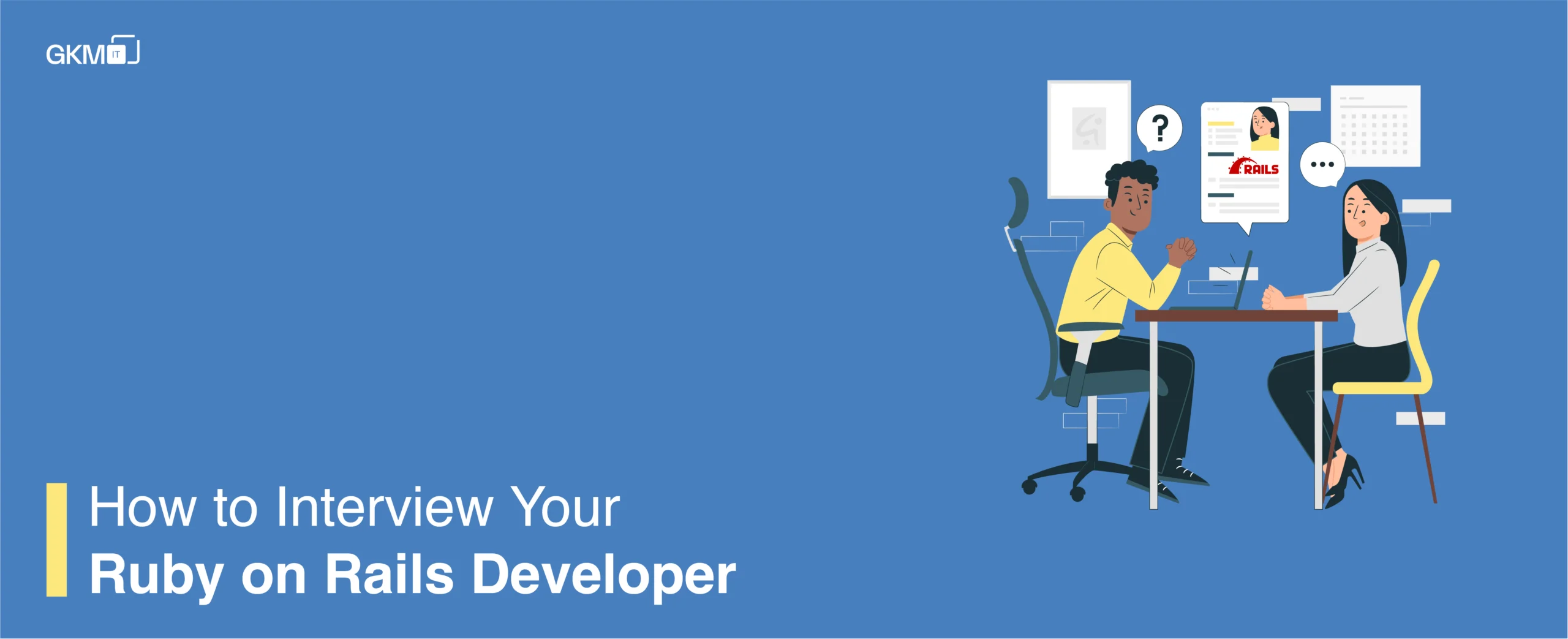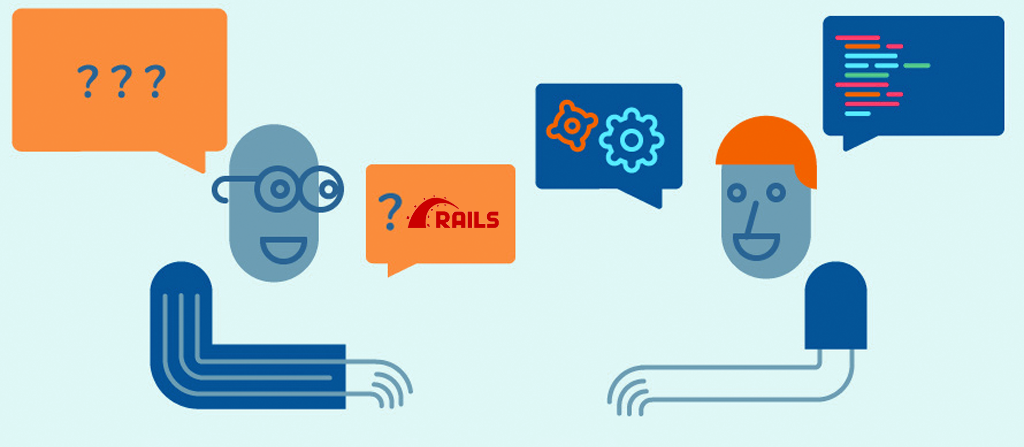
How to Interview Your Ruby on Rails Developer
We at GKMIT want to share our knowledge about how to interview a Ruby on Rails developer. We require great coders to sell great code.
This article will help you when you need to test a Ruby on Rails programmer but not sure what questions to ask in an interview. The article will act as a guide for you during your interview process of Ruby on Rails programmers.
We have tried to include as many questions as possible but can’t include all questions as including every question will make this article lengthy. For example, we have omitted questions like code idioms and cunning expressions in Ruby. We might not give a developer the opportunity to look for answers on the internet as our main purpose is to ensure how a Ruby software engineer expounds his/her knowledge of the domain.
Let’s work on the structure of a Ruby on Rails interview. This article is divided into separate parts to check separate domains of knowledge.
- Ruby questions
- Ruby on rails questions
- A pair of programming task
- A home task
It’s time to check what engineers have to say and what they know!
Ruby questions to test a web developer
Why to ask Ruby related questions to Ruby on Rails developers?
Rails framework is written in Ruby, which means when we write code for Ruby on Rails, we use Ruby. The major problem we face being Ruby on Rails development company is the programmers don’t completely understand the basics. So we assess programmers Ruby competence as we want to hire forward-thinking software engineers who can create high-quality code.
What our Ruby interview usually concerns? Well, we focus on object-oriented programming paradigm and patterns. According to us, a Ruby on Rails developer should be very well aware of the following concepts – class hierarchies, encapsulation, inheritance, and polymorphism.
Okay, so here is our step of moving forward. A candidate should answer the following questions. For Ruby programmers, quality preparation for job interviews is essential. Let’s look at questions that they have to answer satisfactorily, or else we consider the interview already over.
- What is a class?
- What is the difference between a class and a module?
- What is an object?
- How in Ruby you would declare and use a constructor?
- How to create getter and setter methods in Ruby?
- Tell the difference between class and instance variables?
- Explain singleton methods. What is Eigenclass in Ruby?
- Describe Ruby method lookup path.
- Describe available Ruby callbacks. How to use them in practice?
- What is the difference between Proc and lambda?
Our second round of Ruby questions includes business applications.
To work for GKMIT, just knowing the basics isn’t enough for any web development company. A developer should also explain how to write code for business applications. We ask specific questions about Rack as it is a very popular interface. Here is the list of four possible challenges and questions:
- What is Rack?Explain the Rack application interface.
- How does Rack middleware work?
Ruby Gems: the third series of interview questions
Being a popular programming language, Ruby has a vast community of developers and creates helpful libraries. We at GKMIT love Gems as it simplifies and speeds up the work process. We can develop web applications quickly and smoothly through third-party code.
In this part of the interview, let’s check how Ruby web app developers perceive the basic structure of gem library. While building applications on the job, a programmer uses multiple gems, and thus, we need to see if the developer can understand and comprehend code written by other programmers. The candidate should describe RubyGems and what is the special system to create, implement and share gems.
Here is the series of four questions about Ruby gems:
- What is RubyGems? How does it work?
- How can you build your own Ruby gem?
- Elaborate the structure of a Ruby gem.
Interview questions: Ruby on Rails

After Ruby, let’s plunge into the world of the Rails framework. A qualified developer is aware of the Model-view-controller approach while building an application. We have divided a series of Ruby on Rails interview questions in three parts.
First comes general questions related to the rails framework. Second, we check what developers know about routing, controllers and views (the main part of the business application), and third questions related to Active Record to understand how programmers understand the application’s model part. A developer should write a little configuration code as possible when making ActiveRecord models. We test developers’ knowledge of implementing such logic.
Important Ruby on Rails Interview Questions
- What is ActiveJob? When should we use it?
- What is Asset Pipeline?
- Explain the difference between Page, Action, Fragment, Low-Level, SQL caching types.
- What is a Rails engine?
Routing, Controllers, and Views
- Provide an example of RESTful routing and controller.
- Describe CRUD verbs and actions.
- How should you test routes?
- How should you use filters in controllers?
- What are Strong Parameters?
- What do we need to test in controllers?
- How should you use content_for and yield?
- How should you use nested layouts?
Active Record
- Explain the Active Record pattern.
- What is Object-Relational Mapping?
- Describe Active Record conventions.
- Explain the Migrations mechanism.
- Describe types of associations in Active Record.
- What is Scopes? How to use it?
- Explain the difference between optimistic and pessimistic locking.
WebSockets
- What is a PUB/SUB mechanism?
- How can it be implemented in Rails?
Security questions to askRuby on Rails developer

GKMIT believes in the security ofevery application. We work on hiring programmers who understand what types of possible attacks will come and the developer’s deep understanding of unleashing attacks against Rails applications. Besides attacks, a developer should know methods of protection. We check if the programmer knows what type of method to be used against a particular situation and how to deal with attacks. Through the below questions, you can easily make out what we are interested in. Other than rails, we are interested in general web security concepts such as HTTPS instead of HTTP.
Questions related to the same
- Explain what a session mechanism is? How does it work?
- Describe cross-site request forgery, cross-site scripting, session hijacking, and session fixation attacks.
- What is the difference between SQL Injection and CSS Injection?
- How to store secure data such as a password?
- Why we use HTTPS instead of HTTP?
Automated testing in Ruby on Rails- Questions
Without automated testing and just writing code for production is a bad web development process, especially in Ruby, because language itself demands developers to write tests. Automated testing helps to reduce the workload of the quality assurance team and improve the workflow.
Our developers perform automated tests. Thus we expect our interviewees to understand automated testing. All Ruby developers must have a clear view regarding why to use automated tests, when to write them, and what type of test exists. Every Ruby developer should understand testing methods, and developers should know how to create testing cases and are familiar with testing guidelines to ensure best practices.
Question to ask a Ruby on Rails developer about automated testing
- What is unit testing (in classical terms)?
- Tell us the primary technique for writing a test?
- What is TDD andBDD? What is the difference between the two?
- What are your favourite tools for writing unit tests and feature tests?
Refactoring – ask Ruby on Rails developers about it.
We also focus on asking questions related to code refactoring because it is an important step in developing any application. What is refactoring? That is, developers, brush their coding skills and make code clear and efficient. We want our developers to write high-quality code which is maintainable and expandable. In refactoring the GKMIT rails, engineers have to maintain a proper code structure and enhance the application performance without changing the code’s behaviour.
If a developer knows how to reach high-level performance, then the team will be able to improve the app faster in future and can make changes as per the client’s request. The next features of Ruby on Rails interview questions will help you figure out a developer’s ability to write elegant code. We can alter these questions as per primary development concerns.
- What does code smell mean?
- Which tools do you use to find code smells and potential bugs?
- Why should you avoid fat controllers?
- Why should you avoid fat models?
- What is benchmarking?
- Explain extract Value, Service, Form, View, Query, and Policy Objects techniques.
Pair programming task
The next part of the interview involves seeing developers’ involvement and pairing with senior web developers. It is very important to unleash the interviewee’s mind. It doesn’t matter if the interview is taken through hangout or Skype, or in-person we ask the candidate to share their screen and solve a task. Well, now, the question is, what is the purpose of the pair programming test? The reason is it gives a clear view of developers’ line of thinking, and if the task is given, they should suggest the way to solve it or resolve it. This task is very similar to the discussion as our senior web engineer helps the candidate understand what solution is workable and the best. It helps us to determine developers ability to work in a team. Here
is the list of the task we might give to Ruby on Rails candidates.
Exercise
Write a simple code to generate passwords in Ruby on Rails?
- Strong passwords have a mix of lowercase letters, uppercase letters, numbers, and special characters/symbols.
- The password should be minimum 8 characters long.
- Generate a new password every time the user asks for a new password.
- Include your generator code in the “generate_password” function.
The home task for candidates.
It is the final and last task which we give to the interviewee. We figure out if the developer is very well-versed in using multiple back-ends and front-end development technologies. Candidates should have a good grasp of many frontend tools, including JavaScript, programming language, framework and libraries. Proficient knowledge of markup and stylesheets is a must. We also check developers’ ability to write autotest using RSpec, Capybara, and similar tools.
The home task varies as we may ask rails developers, to implement a task with React, Ember or Backbone instead of Angular. The task we give depends on projects, and we hire developers accordingly. We check the result of the developer’s home task and conclude if this programmer is compatible to work with us. The programming task assesses and verifies the skills of the job seeker.
Technical Requirements
- Require a WEB application:
- For the client-side, use HTML5, CSS3, Bootstrap, JavaScript, AngularJS, and jQuery.
- For the server-side, use Ruby on Rails.
- Ensure client-side and server-side validation.
- It should work like a single-page WEB application and should use AJAX technology (load and submit data without reloading a page).
- Ensure user authentication solution. The user should only have access to his/her own projects and tasks (Devise, Cancancan).
- It should have automated tests for all functionality (models – RSpec, controllers – RSpec, acceptance/functional tests – RSpec + Capybara).
Wrapping up –
There are many more questions related to Ruby on Rails interviews, and we might ask a programmer when we hire them. Through this article, our purpose was to show you our process of interviewing and how we organise interviews at GKMIT. The questions asked are designed to analyse programmers skills. Ask these questions to make sure you hire a Ruby on Rails engineer who proves a great asset for your team.